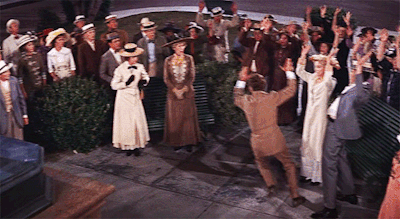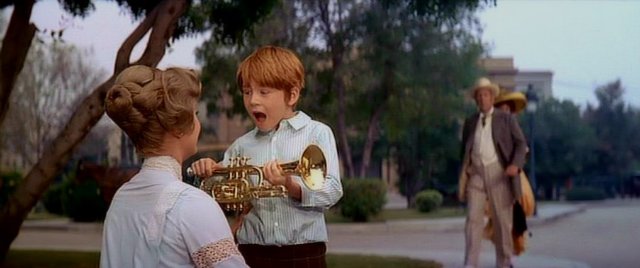Alguns musicais são tão bem sucedidos que
deixam uma marca na cultura pop. Isso significa que você acaba conhecendo as
músicas sem ter que assistir ao musical. Isso aconteceu comigo mais
recentemente quando assisti a “Vendedor de Ilusões” pela primeira vez: percebi
que já conhecia tantas das músicas de antemão. Apesar disso, ou talvez por
causa disso, me diverti muito.
Some musicals are so enormously successful that they leave a mark in pop culture. This means you get to know the songs without having to watch the musical. This happened to me most recently when I watched “The Music Man” (1962) for the first time: I realized I already knew so many songs in it beforehand. Nevertheless, or maybe because of this, I had a great time.
O Professor Harold Hill (Robert Preston) é um
caixeiro viajante que chega a River City, Iowa. Ele vende instrumentos musicais
para formar bandas de jovens. Ele soluciona o problema de a cidade não ter uma
banda de jovens ao encontrar um inimigo que poderia ser combatido com a música:
a nova mesa de bilhar em um saloon.
Professor Harold Hill (Robert Preston) is a travelling salesman who arrives in River City, Iowa. He sells musical instruments to form boys’ bands. He solves the problem of the city not having a boys’ band by finding an enemy that could be fought with music: the new pool table at a saloon.
A organização de uma banda de jovens é,
obviamente, uma maneira do Professor Hill ganhar dinheiro fácil e sair da
cidade. Quase todos no local pareciam animados com a ideia da banda. Quase
todos, menos a bibliotecária local e também professora de piano, Marian Paroo
(Shirley Jones). Mas é exatamente a atenção dela que o Professor Hill quer
obter. Ele conseguirá sucesso em seu esquema e também conquistar a garota?
The organization of the boys’ band is, of course, a way for Professor Hill to earn easy money and leave the town. Almost everybody from River City seemed to get excited about the band. Almost, except the local librarian and also piano teacher Marian Paroo (Shirley Jones). But it’s exactly her attention Professor Hill wants to win. Will he manage to be successful with his scheme and also get the girl?
Creditado como “Ronny Howard”, lá está ele: o
futuro megaprodutor Ron Howard, aos oito anos de idade, como Winthrop Paroo,
irmão mais novo de Marian. Ele está muito bem no papel, e até consegue, de
maneira convincente, fingir falar com a língua presa. De acordo com o IMDB, seu
primeiro papel como ator foi em 1956 - quando ele tinha apenas dois anos de
idade - e a partir daí Ronny fez diversos filmes e séries de TV.
Credited as “Ronny Howard”, there he is: future mega
producer Ron Howard, aged eight, as Winthrop Paroo, Marian’s younger brother.
He is very good in the role, and even manages to believably fake a lisp.
According to IMDb, his first acting credit comes from 1956 - when he was just
two years old - and from them on Ronny appeared steadily on film and TV.
Eu gostaria de destacar Pert Kelton, wue
interpreta a mãe de Marian e Winthrop. Ela também esteve na produção da Broadway
de “Vendedor de Ilusões”. Apesar de este ser seu mais conhecido papel no
cinema, esta filha de artistas do vaudeville apareceu em 47 filmes e programas
de TV, começando em 1929. Ela perdeu o papel de Alice Kramden na popular série
de TV “The Honeymooners” porque seu marido, o também ator Ralph Bell, entrou
para a lista negra durante a Ameaça Vermelha.
I’d like to highlight Pert Kelton, who plays Marian’s and Winthrop’s mother. She was also on the Broadway production of “The Music Man”. Although this is her best known movie, this daughter of vaudevillians appeared in 47 films and TV shows, starting in 1929. She lost the role of Alice Kramden on the popular TV show “The Honeymooners” because her husband, also actor Ralph Bell, was blacklisted during the Red Scare.
Também dignos de nota são os quatro membros do
Conselho Escolar que se tornam um quarteto cantor - eles são todos muito
talentosos! Eles são The Buffalo Bills e também estiveram na produção da
Broadway. Eles foram os Medalhistas Internacionais de 1950 da Sociedade para
Preservação e Encorajamento de Quartetos Cantores de Barbearia nas Américas.
Tendo começado a carreira em 1947 na cidade de Buffalo - de onde vem o nome do
quarteto - o grupo se manteve ativo até 1967 e seu concerto de despedida foi no
famoso Hotel Waldorf-Astoria de Nova York.
Also worth noticing is the four School Board members
who become a singing quartet – they’re all very talented! They are The Buffalo
Bills and were also on the Broadway production. They were the 1950
International Champion Medalist Quartet of the S.P.E.B.S.Q.S.A., the Society
for the Preservation and Encouragement of Barber Shop Quartet Singing in America.
O cérebro por trás de “Vendedor de Ilusões”
é Meredith Wilson. Ele criou River City tendo como inspiração sua cidade natal,
Mason City, Iowa. Tendo sido flautista na banda de John Philip Sousa e na Orquestra
Filarmônica de Nova York, Wilson já havia composto trilhas sonoras para filmes
como “O Grande Ditador” (1940) e “Pérfida” (1941). Depois de uma década de
trabalho no rádio, Wilson presenteou o mundo com “Vendedor de Ilusões”, tendo
trabalhado no musical por oito anos e composto 40 músicas. A peça foi um
sucesso com Robert Preston como o protagonista, um papel que a Warner Bros não
queria que ele repetisse por não ser um nome conhecido. Meredith Wilson ameaçou
cancelar a produção por completo se Preston não ficasse com o papel
protagonista, o que aconteceu depois que nomes como Frank Sinatra, Bring Crosby
e Cary Grant recusaram o papel.
The brain behind “The Music Man” is Meredith Wilson. He based River City on his hometown, Mason City, Iowa. A former flutist at both John Philip Sousa’s band and the New York Philharmonic Orchestra, Wilson had written scores for films such as “The Great Dictator” (1940) and “The Little Foxes” (1941). After a decade’s work on radio, Wilson gifted “The Music Man” to the world, after writing 40 songs in eight years of work. The play was a hit with Robert Preston as the lead, a role that Warner Bros was not willing to let him repeat on film, because Preston wasn’t a bankable star. Meredith Wilson threatened to cancel the production completely if Preston wasn’t cast as the lead, which happened after names like Frank Sinatra, Bing Crosby and Cary Grant refused the role.
“Vendedor de Ilusões”, a peça da Broadway,
ganhou o prêmio Tony de Melhor Musical em 1957, vencendo “Amor, Sublime Amor”
na disputa. Quando foram feitas as adaptações para o cinema, o jogo virou: em
1962 “Amor, Sublime Amor” ganhou 11 Oscars e um ano depois “Vendedor de Ilusões”
venceu apenas um Oscar, Melhor Trilha Sonora Adaptada.
“The Music Man”, the Broadway production, won the Best Musical Tony Award in 1957, beating “West Side Story”. When they became movies, the game changed: in 1962 “West Side Story” won 11 Oscars and one year later “The Music Man” won only one, Best Music, Scoring of Music, Adaptation or Treatment.
O intervalo entre as músicas é mínimo e isto,
junto com alguns truques de iluminação, ajudaram a criar uma aura teatral no
filme. Quando a música para por um período maior, sequências icônicas acontecem,
como aquela em que o Professor Hill fala com Marian sobre ela colecionar “ontens
vazios” (“empty yesterdays”).
The interval between songs is minimal and this, together with some lighting tricks, help create a stagey aura in the film. When the music stops for a little longer, iconic sequences happen, such as the one where Professor Hill talks to Marian about her collecting “empty yesterdays”.
Os 151 minutos de duração do filme fluíram
muito bem. “Vendedor de Ilusões” foi o terceiro maior sucesso de bilheteria de
1962, depois de “O Mais Longo dos Dias” e “Lawrence da Arábia”. Ele merece um
lugar entre os mais divertidos musicais já feitos, e também um lugar entre os
melhores filmes produzidos pela agora centenária Warner Bros.
The 151 minutes flew by. “The Music Man” was the third
highest-grossing film of 1962, behind “The Longest Day” and “Lawrence of Arabia”.
It deserves a spot among the most entertaining musicals ever made, and also
among the best movies released by the now centenarian Warner Bros studio.
This is my contribution to the 100 Years of Warner Brothers blogathon, hosted by Constance and Diana at Silver Scenes.










3 comments:
I love this movie! I'm originally from Iowa, and the whole song about how stubborn Iowans can be always makes me laugh a lot... because I am awfully stubborn myself. I love the whole movie, from costumes to songs to acting to sets. It feels like a happy summer afternoon, even when I watch it in the winter.
This movie is awesome! I've grown up on it, and it never gets old. All the right notes, all the right moves.
This has long been a favorite in our family and my sister and I watch it every July 4th for Independence Day. The songs are marvelous, the color is beautiful and the actors were all so perfectly cast. I especially like Paul Ford and Hermione Gingold. And how wonderful that Wilson was willing to abandon the whole project if Robert Preston wasn't cast in the film. He really was ideal for the part. Thanks for highlighting this great musical for the WB blogathon, Le!
Post a Comment